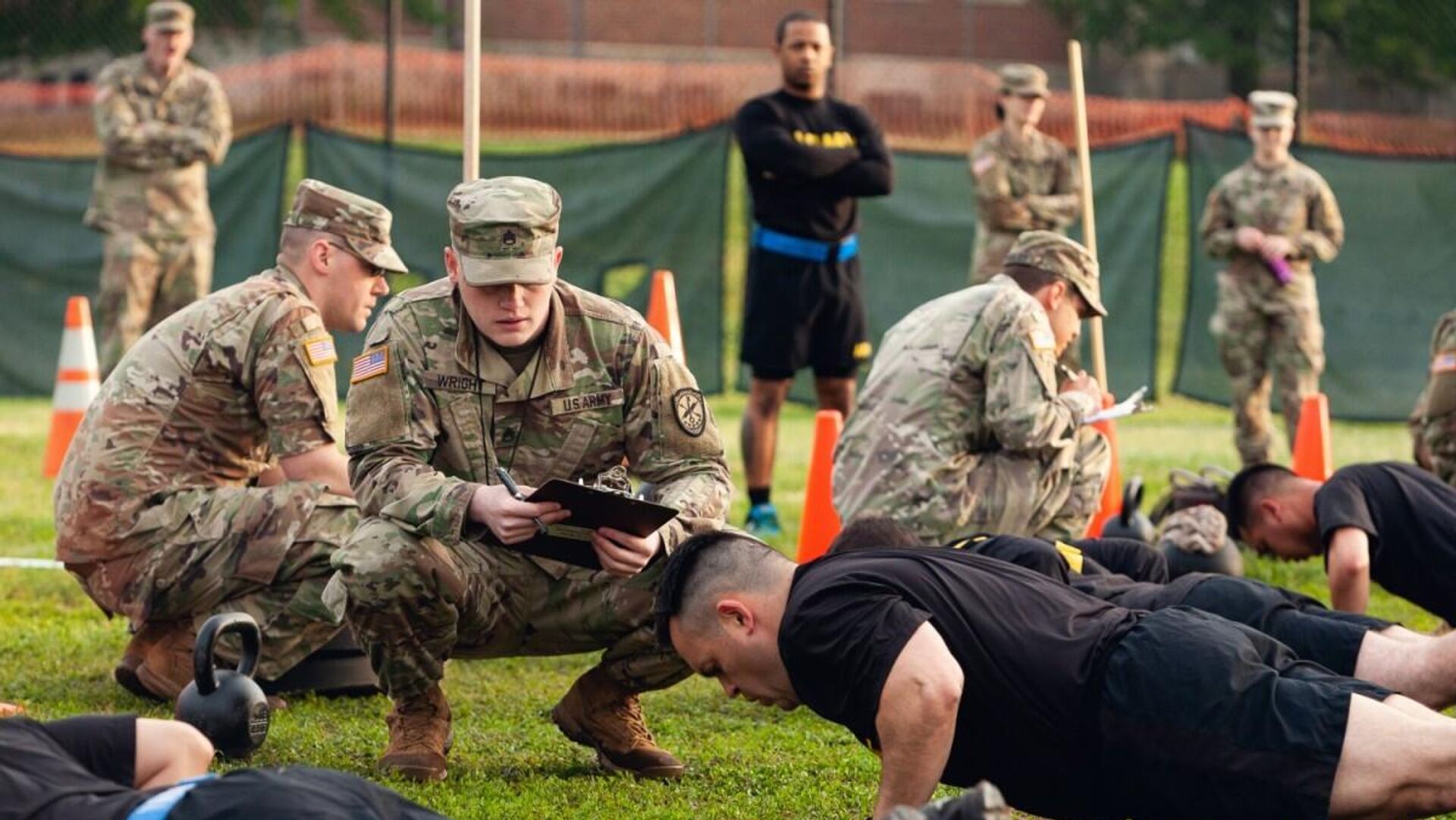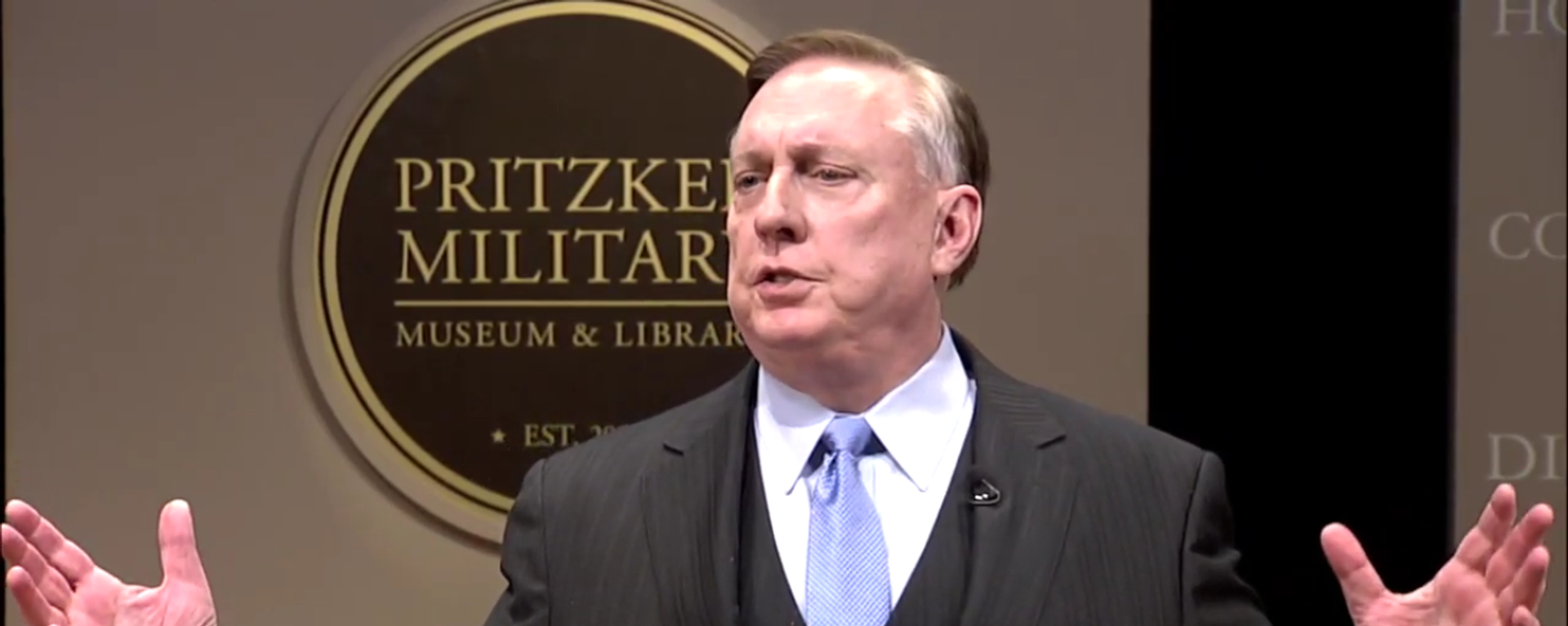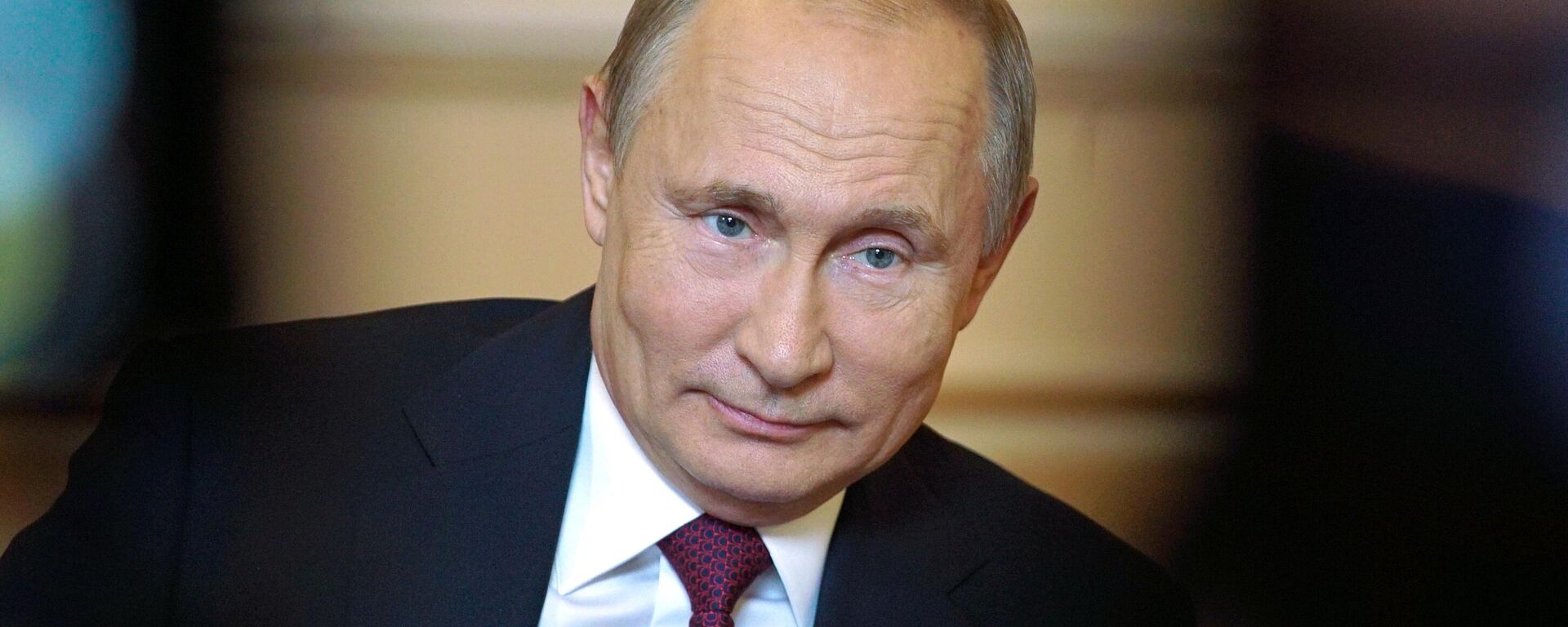https://sputnikglobe.com/20240323/most-americans-think-world-war-is-coming-but-they-dont-want-to-fight-in-it-1117513754.html
Most Americans Think World War Is Coming, but They Don’t Want to Fight in It
Most Americans Think World War Is Coming, but They Don’t Want to Fight in It
Sputnik International
Most Americans think a third world war is either very or somewhat likely in the next 10 years, but only 6% say they would volunteer to fight.
2024-03-23T23:30+0000
2024-03-23T23:30+0000
2024-03-23T23:30+0000
analysis
military & intelligence
americans
russia
china
yougov
world war iii
poll
nuclear war
nuclear warfare
https://cdn1.img.sputnikglobe.com/img/07e6/05/07/1095332212_0:0:1201:676_1920x0_80_0_0_c66ea53092163443f12511dc8c70fdfa.jpg
According to a new YouGov poll released Thursday, most Americans, 61%, think a world war is either “very likely” (22%) or “somewhat likely” (39%) in the next 5-10 years. Only 22% of Americans think a world war is “not very likely” or “not at all likely.”However, according to the same poll, far more Americans say they are either unfit for service or would refuse to serve if drafted than those who say they would volunteer or fight if drafted, even when only counting respondents of military age.Most Americans of all ages, 60%, say they believe the armed services wouldn’t want them due to age or disability, and another 13% said they would refuse to go if drafted. Only 6% of Americans said they would volunteer for military service in the event of a world war and just 9% said they would serve if called up.Focusing on the age groups with the vast majority of fighting-age citizens, 18 to 29-year-olds and 30 to 45-year-olds, improves the numbers somewhat but it remains clear that among the population who would be fighting in a world war, there is little appetite for it, especially if the war is overseas.Among the 18 to 29 age group, 26% say they would refuse to serve, compared to 12% who say they would volunteer and 19% say they would serve if drafted. In addition, 19% of 18 to 29 year olds do not think the military would want them because they are unfit for service. Similar numbers were found in the 30 to 45 group, with 25% saying they would dodge a draft order, compared to 9% who would volunteer and 11% who would go if drafted. Thirty-eight percent of Americans in that group believe the military wouldn’t want them.Even if the US were under the “imminent threat of invasion” only the 18 to 29 year old category includes more Americans, 39%, who say they would volunteer or serve if called up than those who say they would refuse to serve (16%) or don’t believe they are fit for service (15%).But in the 30 to 44 age group, 43% say they are either unfit (28%) or would refuse to fight (15%) compared to just 31% who would serve either voluntarily or if drafted.Unsurprisingly, a large majority of Americans think China and/or Russia are most likely to be the US’ opponents, but more than 50% think Iran, North Korea and Iraq will also oppose the US.The UK, Ukraine and Israel were listed as the US’ most likely allies, with Germany, France and Australia also getting higher than 50%.While far more Americans think the US would win against either the individual or combined forces of Russia and China than those who think the US would lose, large percentages of Americans say they are not sure who would win (36% against Russia, 40% against China, and 42% against both.)That could be because, as every permanent UN Security Council member (US, China, Russia, France and the UK) affirmed in a rare joint statement in 2022 “a nuclear war cannot be won and must never be fought.” Towards that point, very few Americans, just 11%, think the US should strike China or Russia with a nuclear weapon if they hit a military target in Taiwan or Ukraine with a nuclear weapon. That number increases somewhat (13% for Russia and 14% for China) if those countries hit a city instead of a military target.In fact, more Americans think the US should take action short of war or no action at all (42%) than those who think the US should respond by declaring war or using a nuclear weapon (32%).Even if America was itself the victim of a nuclear attack, the appetite for a nuclear response is surprisingly low. Only 27% say the US should respond with nuclear weapons if attacked with a “small nuclear weapon on a military target” and only 38% want the US to respond with a nuclear strike if an American city is hit with a nuclear weapon.The official policy of the US government is to “rely on nuclear weapons to deter all forms of strategic attack – including nuclear employment of any scale” against “the vital interests of the United States or its allies and partners.”
https://sputnikglobe.com/20240305/us-military-struggles-to-recruit-due-to-foreign-intervention-policy---former-army-colonel-1117136874.html
https://sputnikglobe.com/20240313/putin-says-need-to-use-tactical-nuclear-weapons-never-arose-in-ukraine-1117295403.html
russia
china
Sputnik International
feedback@sputniknews.com
+74956456601
MIA „Rossiya Segodnya“
2024
News
en_EN
Sputnik International
feedback@sputniknews.com
+74956456601
MIA „Rossiya Segodnya“
Sputnik International
feedback@sputniknews.com
+74956456601
MIA „Rossiya Segodnya“
world war 3, is america ready for a world war, us army recruiting,
world war 3, is america ready for a world war, us army recruiting,
Most Americans Think World War Is Coming, but They Don’t Want to Fight in It
In January, the Bulletin of the Atomic Scientists announced that it was keeping its "Doomsday Clock" at 90 seconds until midnight, after it moved it to that record setting number in 2023 citing "unprecedented global danger."
According to a
new YouGov poll released Thursday, most Americans, 61%, think a world war is either “very likely” (22%) or “somewhat likely” (39%) in the next 5-10 years. Only 22% of Americans think a world war is “not very likely” or “not at all likely.”
However, according to the same poll, far more Americans say they are either unfit for service or would refuse to serve if drafted than those who say they would volunteer or fight if drafted, even when only counting respondents of military age.
Most Americans of all ages, 60%, say they believe the armed services wouldn’t want them due to age or disability, and another 13% said they would refuse to go if drafted. Only 6% of Americans said they would volunteer for military service in the event of a world war and just 9% said they would serve if called up.
Focusing on the age groups with the vast majority of fighting-age citizens, 18 to 29-year-olds and 30 to 45-year-olds, improves the numbers somewhat but it remains clear that among the population who would be fighting in a world war, there is little appetite for it, especially if the war is overseas.
Among the 18 to 29 age group, 26% say they would refuse to serve, compared to 12% who say they would volunteer and 19% say they would serve if drafted. In addition, 19% of 18 to 29 year olds do not think the military would want them because they are unfit for service. Similar numbers were found in the 30 to 45 group, with 25% saying they would dodge a draft order, compared to 9% who would volunteer and 11% who would go if drafted. Thirty-eight percent of Americans in that group believe the military wouldn’t want them.
Even if the US were under the “imminent threat of invasion” only the 18 to 29 year old category includes more Americans, 39%, who say they would volunteer or serve if called up than those who say they would refuse to serve (16%) or don’t believe they are fit for service (15%).
But in the 30 to 44 age group, 43% say they are either unfit (28%) or would refuse to fight (15%) compared to just 31% who would serve either voluntarily or if drafted.
Unsurprisingly, a large majority of Americans think China and/or Russia are most likely to be the US’ opponents, but more than 50% think Iran, North Korea and Iraq will also oppose the US.
The UK, Ukraine and Israel were listed as the US’ most likely allies, with Germany, France and Australia also getting higher than 50%.
While far more Americans think the US would win against either the individual or combined forces of Russia and China than those who think the US would lose, large percentages of Americans say they are not sure who would win (36% against Russia, 40% against China, and 42% against both.)
That could be because, as every permanent UN Security Council member (US, China, Russia, France and the UK) affirmed in a rare joint statement in 2022 “a nuclear war cannot be won and must never be fought.” Towards that point, very few Americans, just 11%, think the US should strike China or Russia with a nuclear weapon if they hit a military target in Taiwan or Ukraine with a nuclear weapon. That number increases somewhat (13% for Russia and 14% for China) if those countries hit a city instead of a military target.
In fact, more Americans think the US should take action short of war or no action at all (42%) than those who think the US should respond by declaring war or using a nuclear weapon (32%).
Even if America was itself the victim of a nuclear attack, the appetite for a nuclear response is surprisingly low. Only 27% say the US should respond with nuclear weapons if attacked with a “small nuclear weapon on a military target” and only 38% want the US to respond with a nuclear strike if an American city is hit with a nuclear weapon.
The official policy of the US government is to “rely on nuclear weapons to deter all forms of strategic attack – including nuclear employment of any scale” against “the vital interests of the United States or its allies and partners.”




